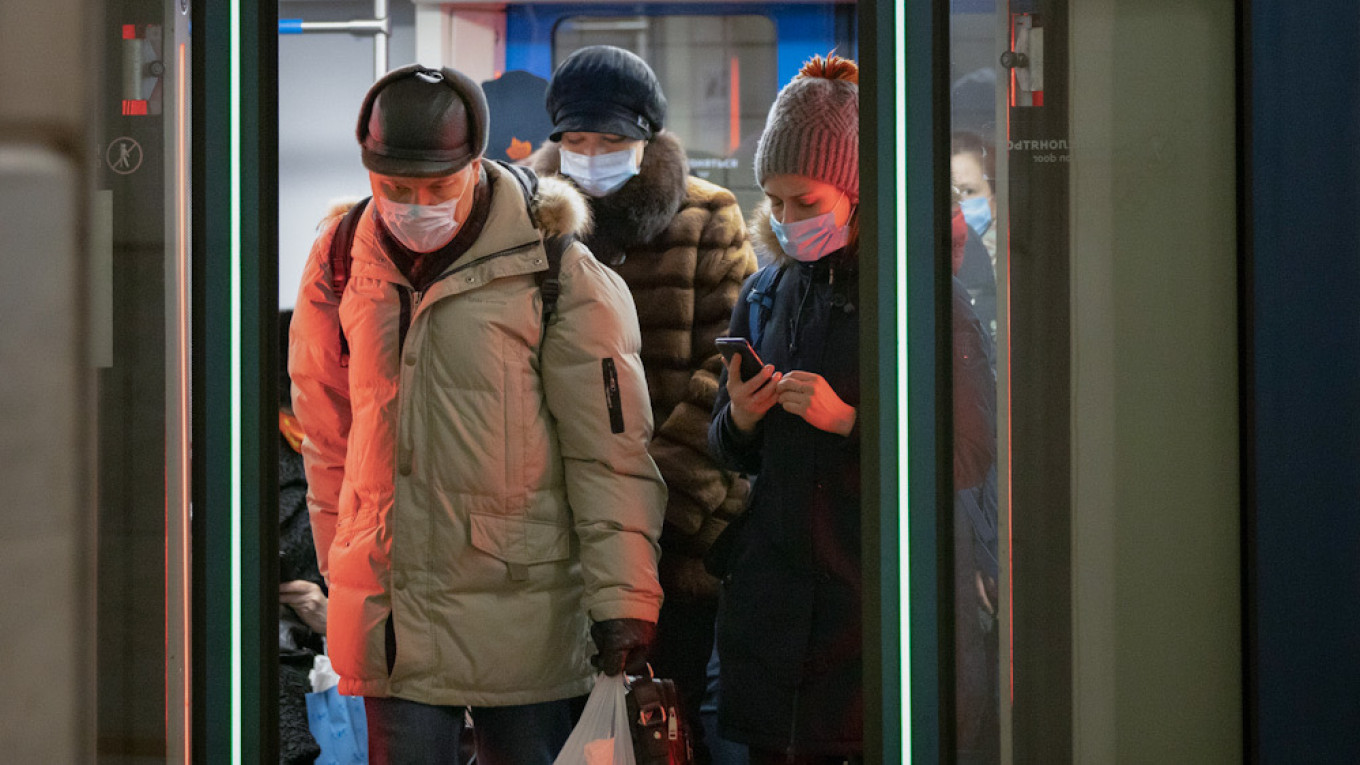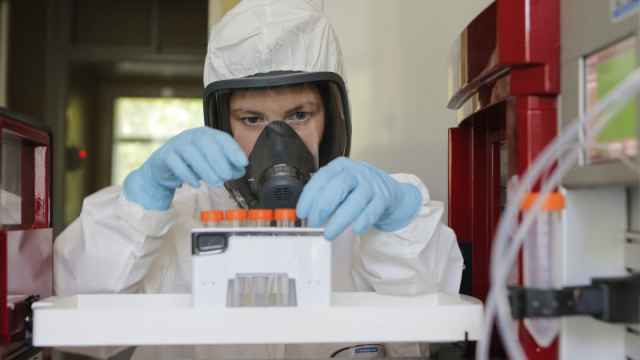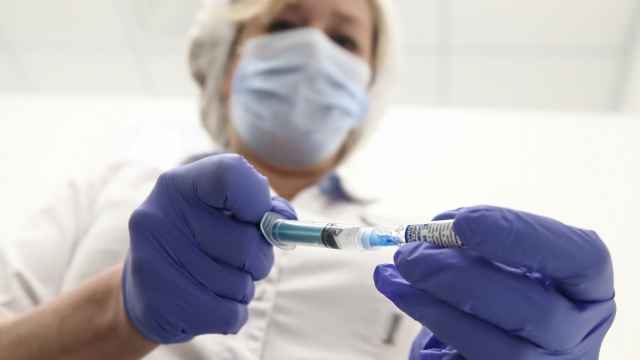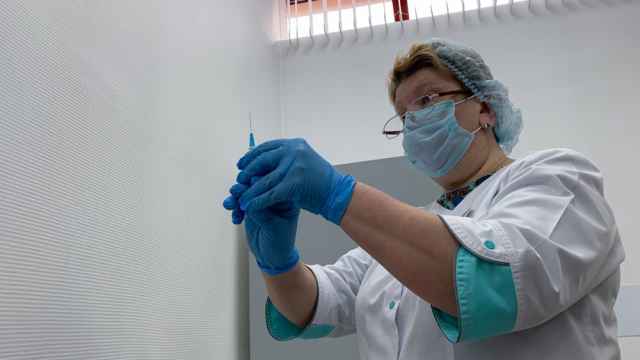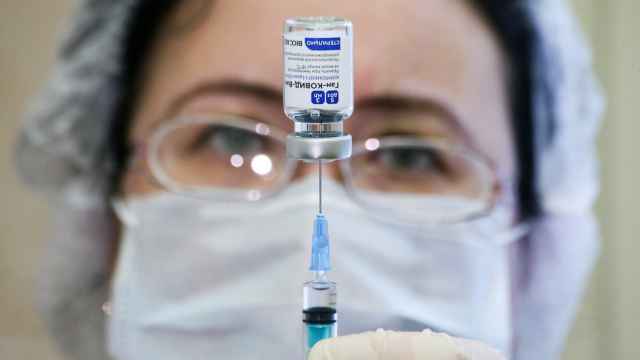The official Twitter account for Russia’s coronavirus vaccine announced on Jan. 11 that “over 1.5 million people have already been vaccinated with Sputnik V as part of the mass scale vaccination in Russia.”
As the country seeks to vaccinate more people and claim one of the top spots in the global vaccine race, the tally, which accounts for about 1% of Russia’s 146 million people, was the latest in a series of rapidly escalating counts of how many jabs it has administered.
But the Kremlin’s desire to be one of the world’s top performers is raising fresh concerns that its coronavirus-related numbers, once again, don’t add up. Independent analysis suggests Russia could be overstating the number of people it has vaccinated by five-fold.
The debate surrounding the vaccine echoes Moscow’s early statements that it was handling the pandemic better than other countries by keeping testing rates higher and cases and deaths lower — even as evidence mounted of a potentially dramatic undercount of the virus’ true toll.
Data analyst Alexander Dragan — who has been tracking Russia’s coronavirus statistics closely and was one of the first to accurately highlight the country’s probable massive undercount of virus deaths — said Russia’s patchy data points not to the claimed 1.5 million completed vaccinations since the public campaign was launched at the beginning of December, but fewer than 300,000.
“Russia claims 1.5 million people have been vaccinated. There is one problem: it is not clear who,” Dragan said. “The national data is strikingly different from the regional level.”
Five times lower
Russia is not publishing an official nationwide tally of how many people have been vaccinated. Instead, the authorities release sporadic updates through the Sputnik V twitter account, televised government meetings or officials in interviews with state-owned media outlets.
But many of Russia’s 85 regions are sharing more precise information on exactly how many people have been vaccinated. And these tallies have led Dragan and other statisticians to grow sceptical of the 1.5 million figure.
For instance, on Jan. 11, areas accounting for 59% of Russia’s population published vaccination data for their regions, according to numbers collated by Dragan. The combined tally stood at 111,000 — just 7.4% of the nationwide figure officials published that same day.
Extrapolating for the rest of the country, and factoring in the higher rate of vaccinations in Moscow — which has not published a number on completed vaccines since the end of December — Dragan estimates the true number of vaccinations that Russia has completed as part of its public campaign is “300,000 at best.”
His assessment has been endorsed by a small community of independent statisticians and number crunchers who have been closely following and scrutinizing Russia’s official pandemic statistics for months — including those who correctly predicted a surge in excess fatalities as the country continued to say its death rate was among the world’s lowest.
“It’s completely unclear where these 1.5 million people are coming from,” Mikhail Tamm, a statistician at the Higher School of Economics (HSE) in Moscow, said of the numbers released through the Sputnik V Twitter account.
“If you look into the numbers reported by local authorities and work with them … you get a figure roughly five times lower. It could be 250,000 or 300,000 — maybe a little more.”
Alexey Raksha, a former demographer at Russia’s state statistics agency Rosstat who was fired for questioning the method of counting coronavirus fatalities, also said he believes the true figure is likely fewer than 300,000.
“I don’t believe that 1.5 million have been vaccinated,” he told The Moscow Times.
Information campaign
There could be both internal and external reasons for Russia’s seemingly generous accounting, analysts suggested.
“They definitely want to look good internationally,” said Tamm. “This whole campaign around the Sputnik vaccine was always part of an international competition.”
“In my experience, it’s part of a propaganda and disinformation campaign, against the background of growing incompetence — to throw different numbers at people and confuse them by loudly announcing large numbers and then sometimes, shamefacedly, laying out the true, smaller figures,” Raksha said.
Another audience could be domestic — publishing statistics showing hundreds of thousands of jabs being administered every day as a campaign to instill confidence among a hesitant population, particularly after a slow initial rollout. “Somebody is much more likely to agree to be vaccinated if they realize that hundreds of thousands or millions of people have already done it,” Dragan said.
President Vladimir Putin announced Wednesday the country would step-up its vaccination drive — cryptically announcing a switch from “large-scale” to a “mass” vaccination campaign. The Health Ministry followed by ordering regions to open more vaccination centers around the country.
The missing million
So where are the missing million-plus people Russia says it has vaccinated — and where does the figure of 1.5 million come from?
A small chunk comes from what Dragan calls a “parallel” vaccination campaign that Russia has been operating since last spring — months before any data on Sputnik V’s controversial safety trials had been published.
Under that program, Russia vaccinated thousands of the country’s political and business elite, as well as medics working in coronavirus wards, and military personnel. Just before Russia launched its large-scale public vaccination campaign in early December, Health Minister Mikhail Murashko said more than 100,000 Russians had already been vaccinated with Sputnik V.
The non-public vaccination campaigns have also continued, in particular among military personnel and other specialist groups, such as state officials in closed cities and Russia’s cosmonauts.
But the 1.5 million number can’t be accounted for by the inclusion of these special groups, data scientist Boris Ovchinnikov, another statistician and head of the Data Insight analytics company, told The Moscow Times.
“The real number is still significantly lower — there’s something like one million missing.”
Moreover, amid production problems and rollout hiccups, these campaigns could also be going slower than initially hoped. Defence Ministry data covering four of Russia’s five military zones showed it had completed 50,000 vaccinations earlier this week. In early December, the plan was for 100,000 by the end of 2020.
Raksha suggested that Russia could be counting the number of doses produced, not vaccines administered, in a bid to make the start of the vaccination campaign appear faster. But Russia stated two weeks ago that it had already produced 1.5 million doses.
Others didn’t rule out the possibility the number was simply “plucked from the air.”
“Unfortunately, we’ve seen this happen with data many times throughout the coronavirus pandemic,” said Ovchinnikov
“Maybe it’s a completely invented number, and they just don’t even bother to invent all seven digits,” Tamm added, referring to the fact the nationwide number is always presented as a round figure, prefixed with “more than,” as opposed to a specific number.
Silent Moscow
Details on the rollout in Moscow — with its population of 12 million — remain sketchy and anecdotal.
At the end of December, Mayor Sergei Sobyanin said the capital had completed 50,000 vaccinations. But since then, no new figures have been published. Officials say only that the pace of vaccinations — which hit around 3,500 a day in the final week of 2020 — has increased.
In recent days, the gap between regional figures and officials’ nationwide numbers has grown even wider, Dragan said. Over Russia’s ten-day New Year and Christmas public holiday period, officials said the number of total vaccinations nearly doubled from “more than 800,000” to “more than 1.5 million” — pointing to an average rate of 70,000 a day and surpassing 100,000 in the last few days.
But there is no information about where this increase has come from. In the regions that have published their own data, vaccinations were proceeding at just a tenth of that pace on a per capita basis.
“The numbers don’t come close to adding up,” said Judy Twigg, a professor of political science at Virginia Commonwealth University and expert on Russia’s healthcare system.
“They probably don’t even know how many vaccines have been distributed and put in people’s arms.”
Russia is not alone in hitting early snags in the rollout, she added.
“Many countries are screwing up vaccine distribution right now. But Russia has clearly been overstating how much vaccine is out there and how many people have taken one.”
Some experts fear officials are now caught in an over-reporting trap.
“They have to keep increasing the speed of vaccinations, so they’ll have to keep inflating the numbers more and more.” said Ovchinnikov.
“How are they going to make this add up when we get into the tens of millions?”
A Message from The Moscow Times:
Dear readers,
We are facing unprecedented challenges. Russia's Prosecutor General's Office has designated The Moscow Times as an "undesirable" organization, criminalizing our work and putting our staff at risk of prosecution. This follows our earlier unjust labeling as a "foreign agent."
These actions are direct attempts to silence independent journalism in Russia. The authorities claim our work "discredits the decisions of the Russian leadership." We see things differently: we strive to provide accurate, unbiased reporting on Russia.
We, the journalists of The Moscow Times, refuse to be silenced. But to continue our work, we need your help.
Your support, no matter how small, makes a world of difference. If you can, please support us monthly starting from just $2. It's quick to set up, and every contribution makes a significant impact.
By supporting The Moscow Times, you're defending open, independent journalism in the face of repression. Thank you for standing with us.
Remind me later.



